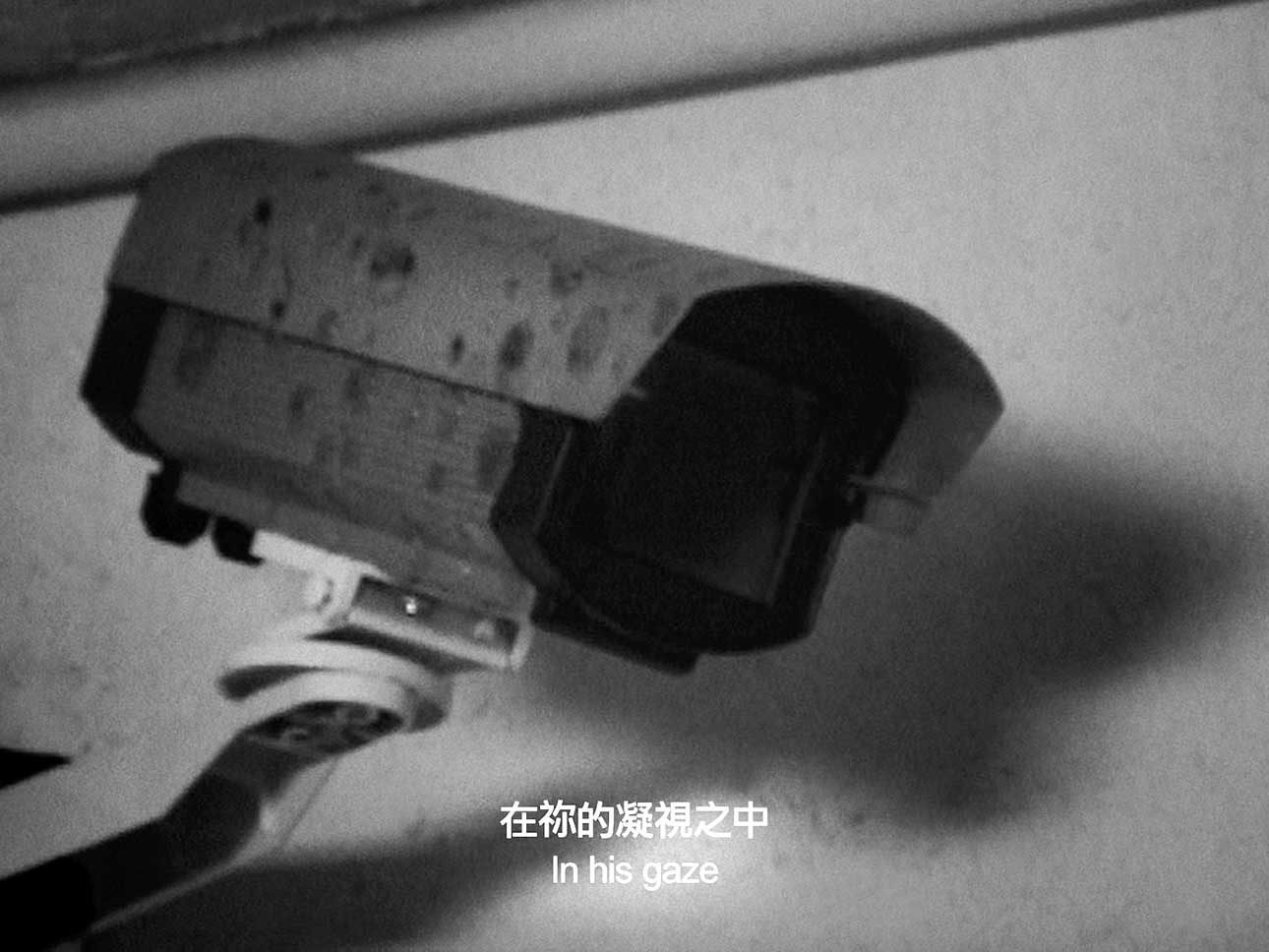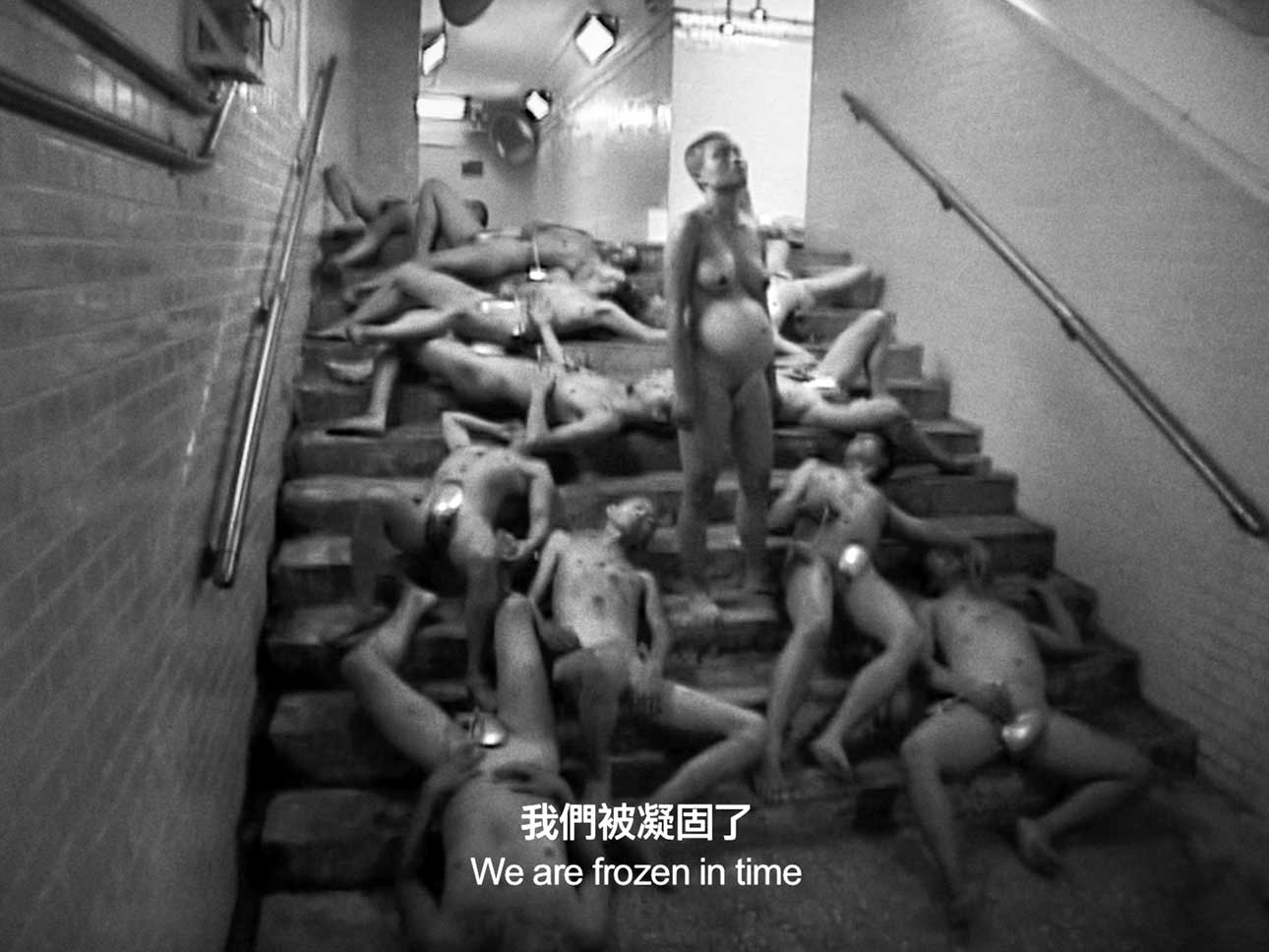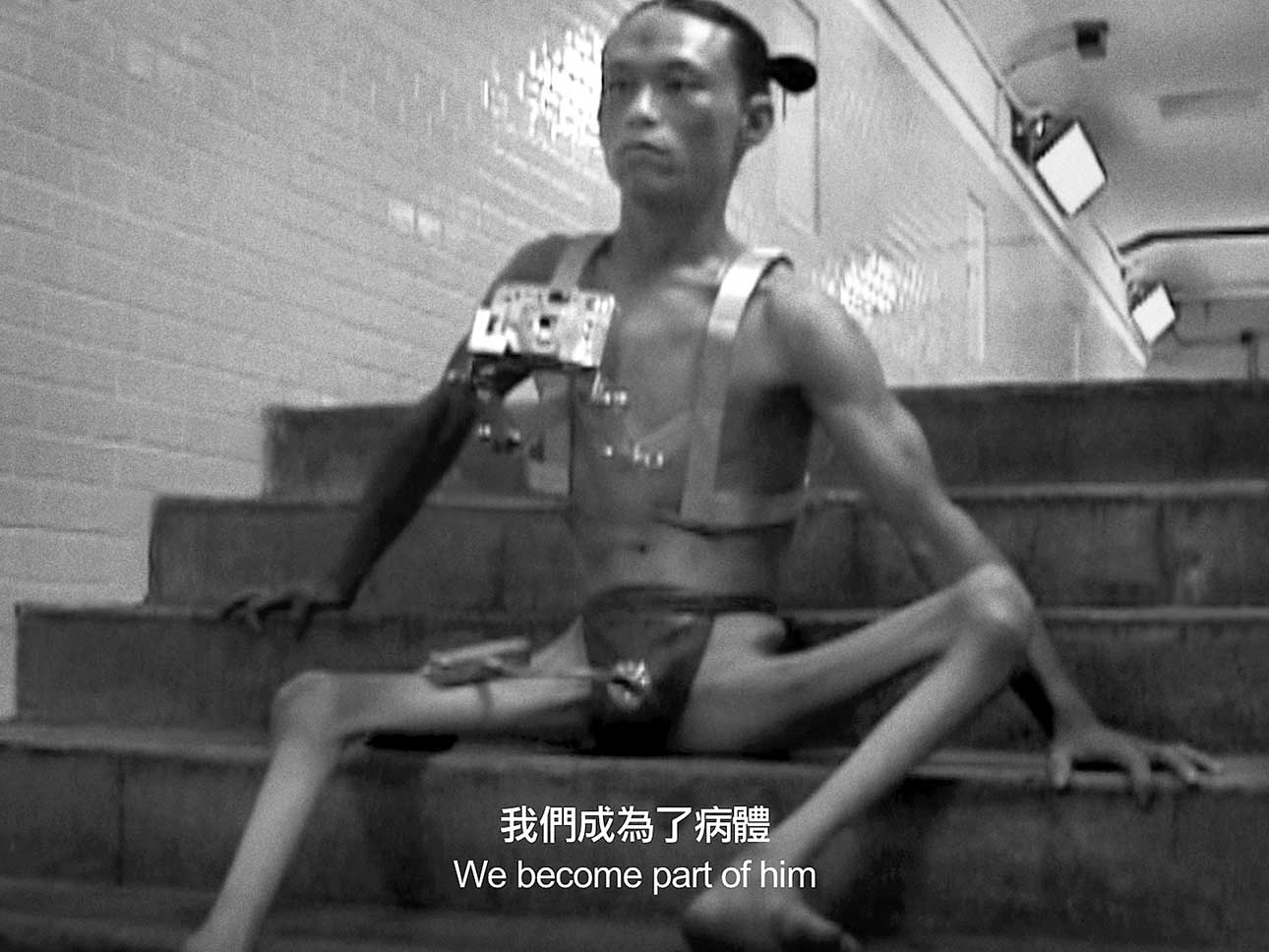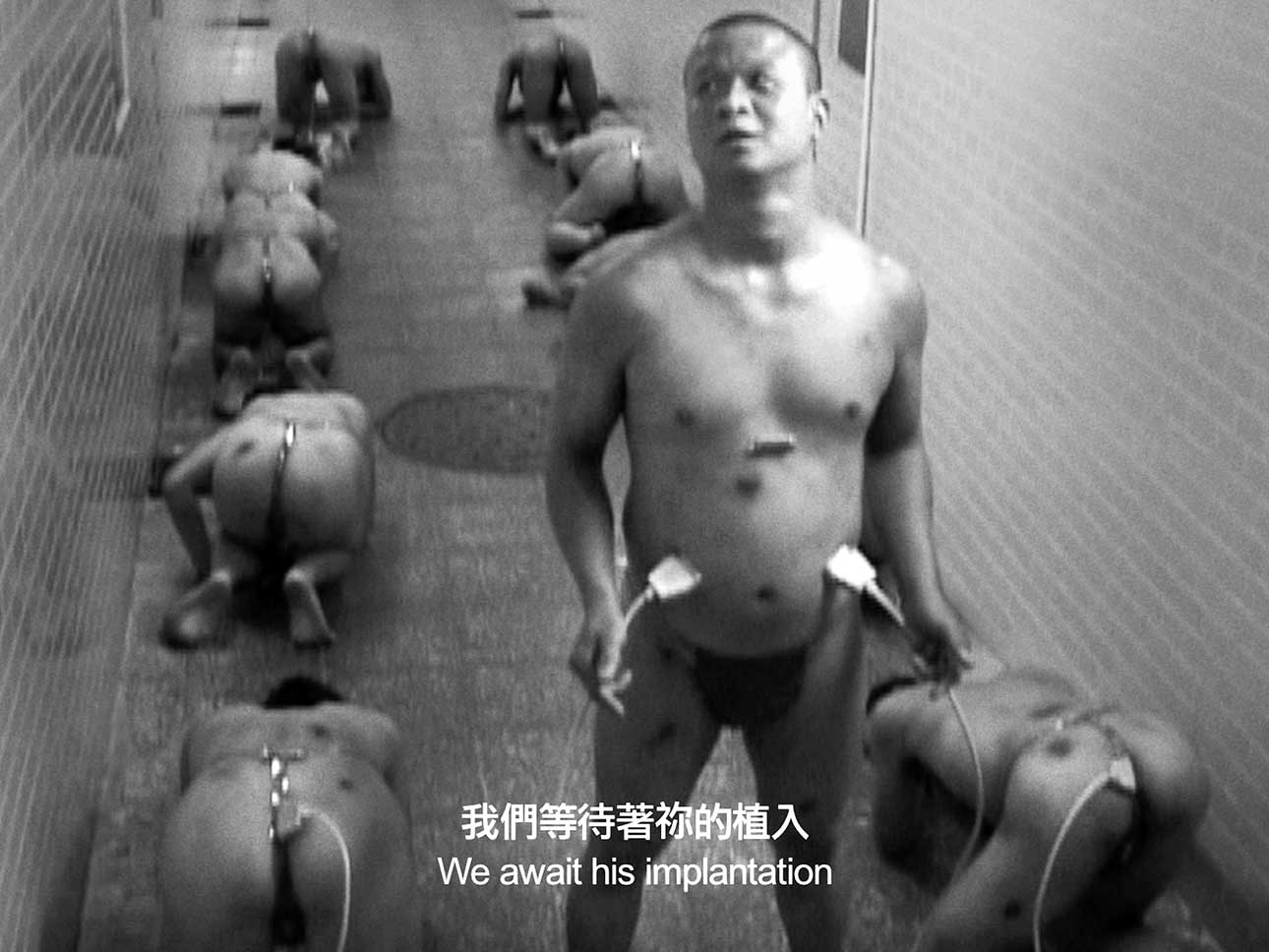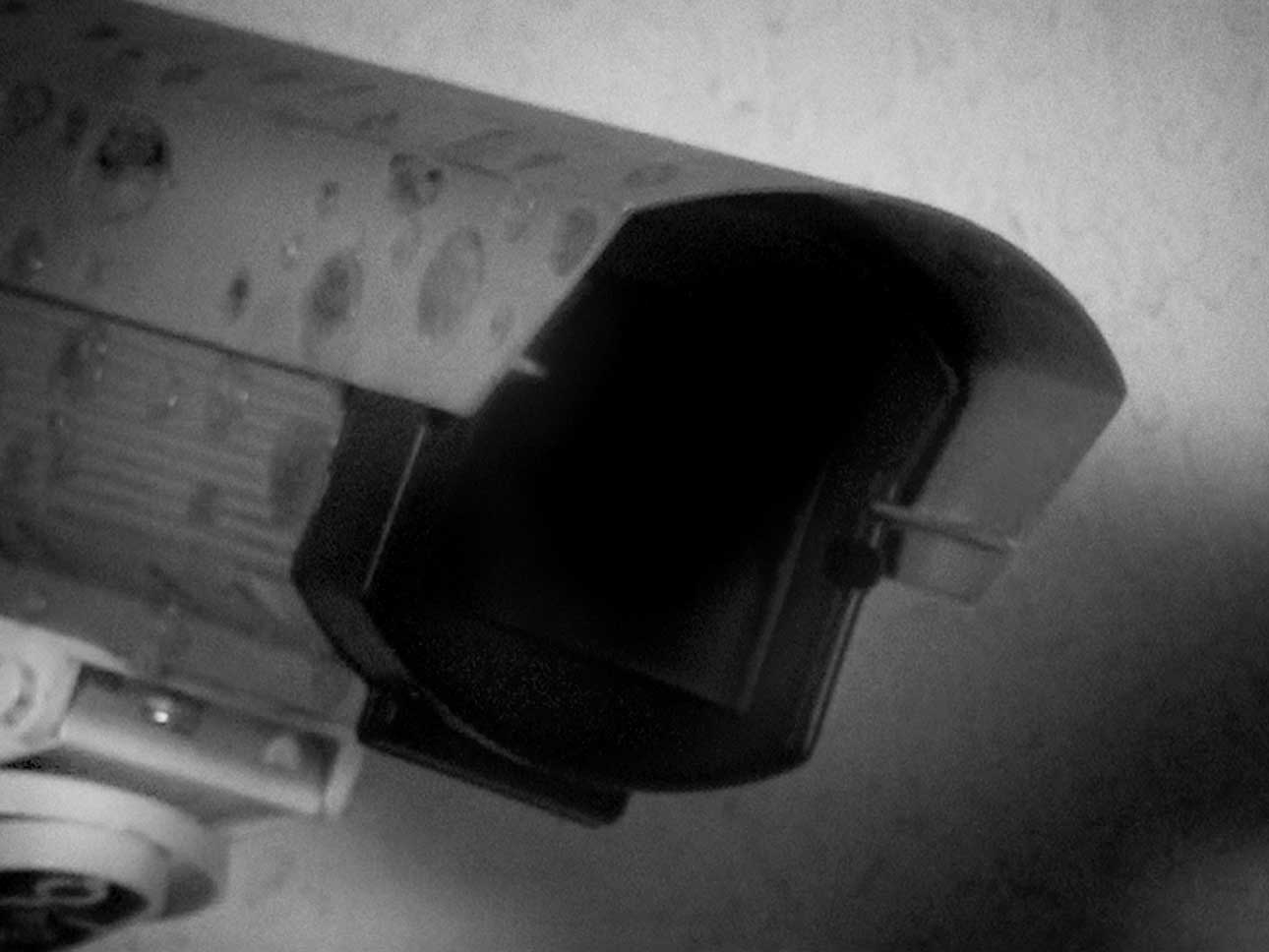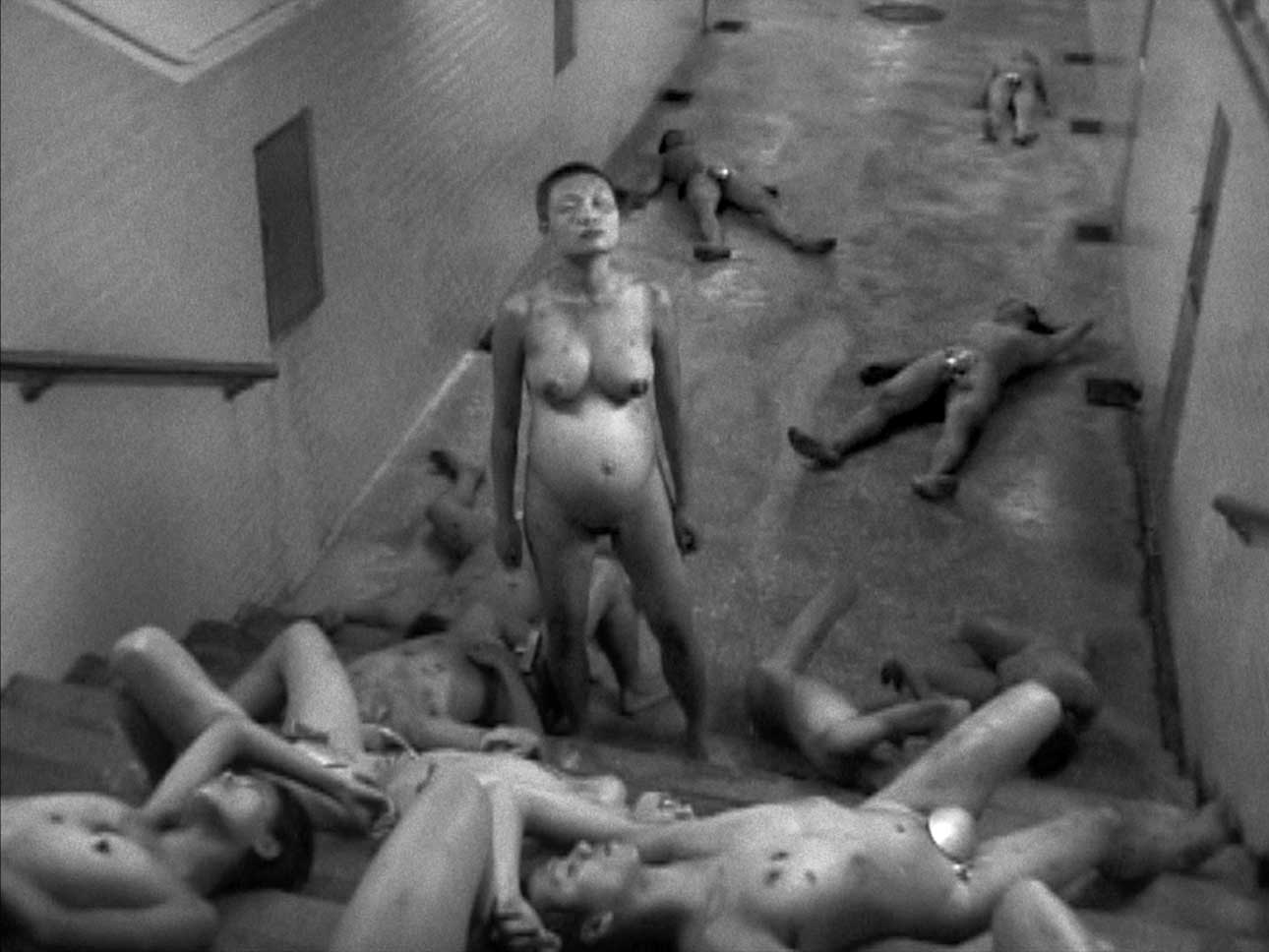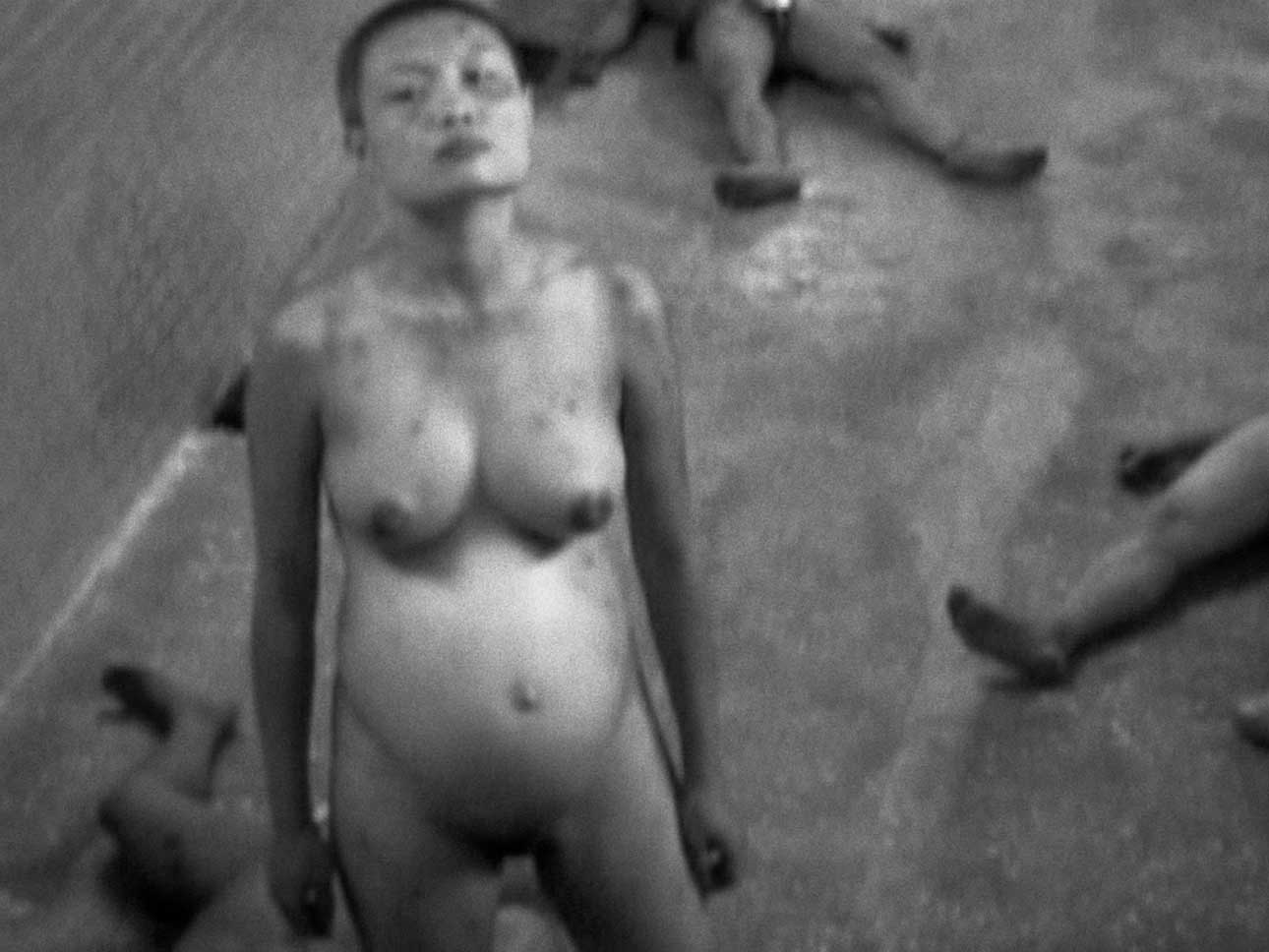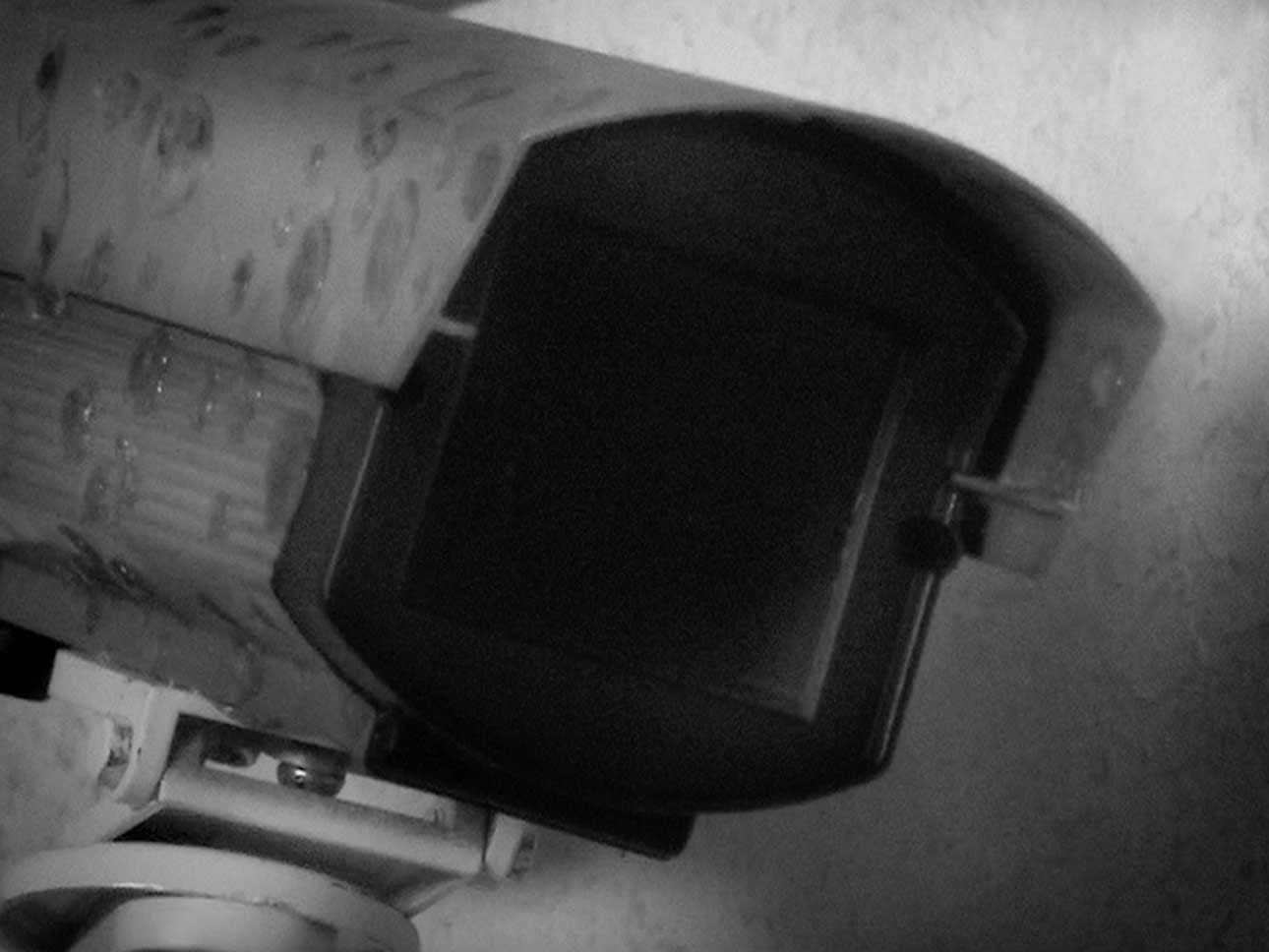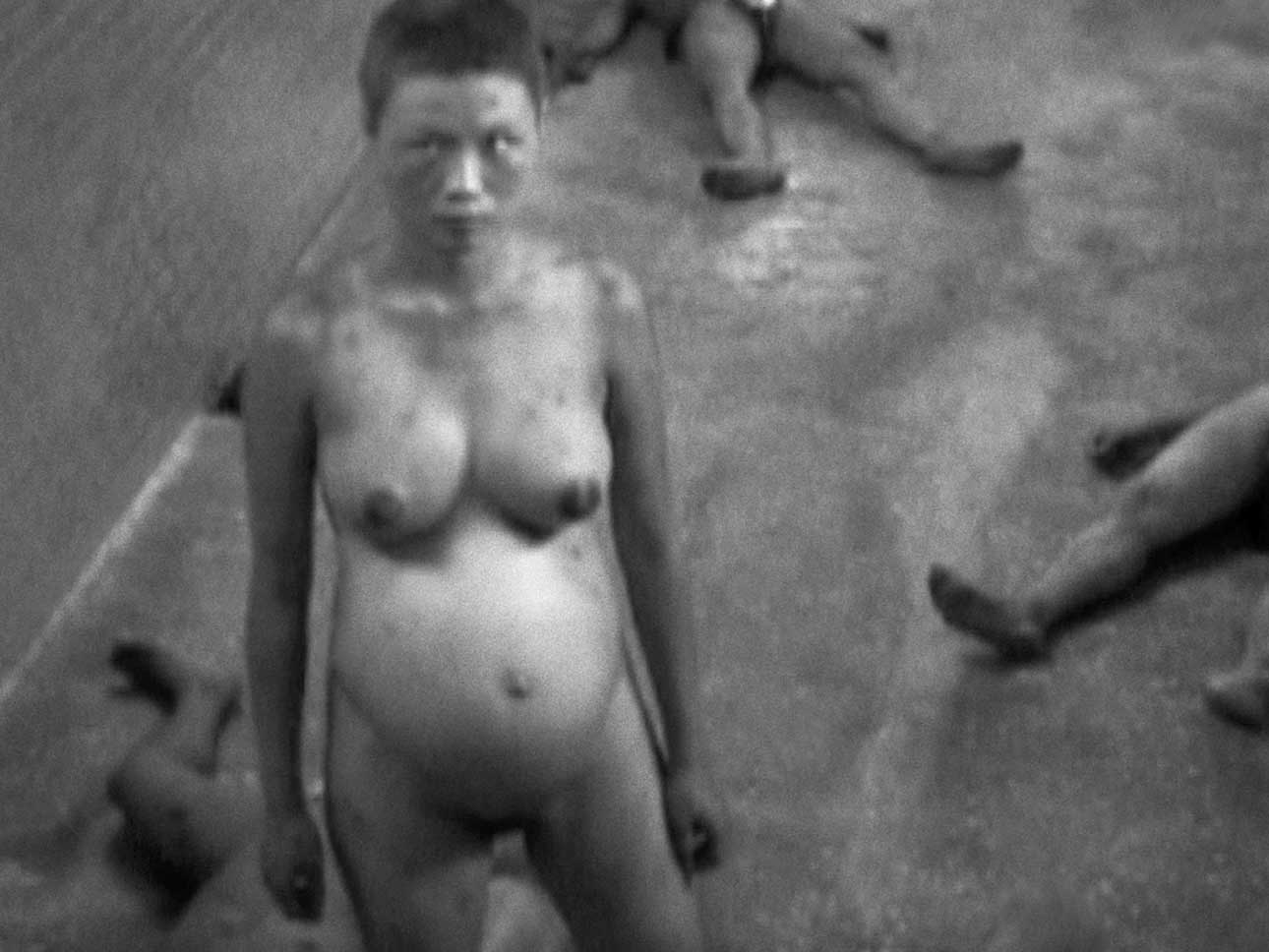Notes on the Twelve Karmas
1999—2000/Re-edited 2018
DV converted to digital file.black and white.silent.8’ 16”.single-channel video
Introduction
The basis for Notes on the Twelve Karmas is a short film that Chen Chieh-jen shot and edited between 1999 and 2000 while making a series of photographs titled The Twelve Karmas.(1) The series was based on the notion of rehearsing for life in future society, and also the notion that the future as a concept usually delivers less than what has been promised, and is therefore a sham. At the time, Chen had planned to extend this short preliminary film into a full-length film, but that was never realized due to lack of funds.
In the film, two visually impaired people are in a closed space filled with surveillance cameras. They imagine a future world shaped by accelerated technological development, and in this world, there is a pregnant woman who dreams that her baby is born during a pandemic. There are also several posthumans who are uncertain what to think or do after their network cables become disconnected from their host computer. All of this is recorded by the surveillance cameras and uploaded to the host computer, which is in an unknown location.
Nearly two decades later, we had fully entered a internet world guided by the corporatocracy’s pervasive control technology, which meant that anyone engaged in the seemingly normal activities of working, socializing, shopping, or gaming online could be monitored or controlled at any time. This situation prompted Chen to re-edit his film. Even though our world is not suffused with the apocalyptic atmosphere we see in the film, we live in a bio-political state of constant monitoring and manipulation that arises not only from technology, but also our endless desire. This same idea is discussed in Buddhism’s Twelve Karmas.
Interview Excerpts
As everyone knows, we live under pervasive control technology created by a corporatocratic empire composed of multinational financial-capital corporations, military-industrial complexes, and digital and biotech giants. In this world, we have no privacy and are awash in post-truth political claims because algorithms continuously processing our data have rendered our lives completely transparent. In other words, our feelings, desires, and ways of thinking can be fully controlled by the corporatocracy’s pervasive control technology.
Even if we completely avoid using the Internet and digital currencies, give up mobile devices such as cell phones that have become integral parts of our bodies, or even more extreme, discard our various chip-embedded identity cards, we still cannot escape being monitored by the high-speed facial, gait, and voice recognition systems that permeate the world. This suggests that there is no world outside of digital systems, and furthermore, in this world, we can be turned into people utterly unrecognizable to ourselves, or even completely deleted from the system, thus rendering us non-existent.
We all know that the most direct way to change this strictly controlled world, which can seem deceptively open because it is free of walls, is through legislation requiring the corporatocracy to be completely transparent about affairs belonging in the commons, and to turn over records of non-criminal behavior to the individuals recorded so that they may decide whether this information should be retained.
But if such legislation were passed, it would no doubt be a challenge to that corporatocracy consisting of multinational financial-capital corporations, military-industrial complexes, and digital and biotech giants. Furthermore, this sprawling empire has established itself in most sovereign countries to the extent that they are powerless to fight back.
In addition to eroding personal privacy, this corporate empire has exacerbated wealth inequality with the promotion of its neoliberal, neocolonial, and neo-caste system policies. According to Oxfam’s 2018—2019 annual report, “In 2018, the world’s 26 richest people owned as much wealth as the poorest 3.8 billion.”(2) In other words, the creation of neocolonial and neo-caste systems are now underway, and we are on our way to becoming the new untouchables.
So, what can be done?
My inspiration for creating Notes on the Twelve Karmas in 1999 was related to my experience of using a computer for the previous four years. However, I had always harbored cautious skepticism about the technological optimism prevalent at the time because the history of human society teaches us that new technological revolutions always bring new forms of colonialism. It could be seen by 1999 that multinational financial-capital corporations and high-tech companies controlling the Internet were thoroughly integrated and developing a new form of colonialism, but its extent could not be fully imagined at the time. Therefore, I started to film Notes on the Twelve Karmas, in which I wanted to take the fact that we were facing new colonial forms and connect it with the trajectory of human society encountering the visible and invisible colonial history that began in the industrial revolution, and situate all of this in a format of a dystopian science-fiction. Although I was never able to raise the funds for this highly ambitious project and only left some preliminary video clips, it prompted me to think about what we would have done if a new and much stronger colonial form, or even a new caste system, came into existence.
This is also how I started experimenting with the use of various self-organizing principles, mainly those based on bodily social interaction, to shoot my films, and also why I started cooperating with unemployed, temporary, and migrant workers, and foreign spouses, unemployed youth, and social activists.
Facing a Internet world of pervasive control technology guided by the corporatocracy and serving as tools of neo-colonialism, those who do not completely control technology, which is the vast majority of the world’s people, can use the fact that their physical bodies and ephemeral bodily experiences cannot be uploaded to the Internet as an ultimate weapon.
While I do believe that technology has contributed to the development of human society, it has also become a tool of neo-colonialism. Therefore, I want to make the point that, if we can learn the Buddhist methods of using desire to transform desire and using māyā to detoxify illusion,(3) then we can, based on bodily experience, learn to perceive a view of non-verbal, non-data śūnyatā that cannot be accurately calculated using any algorithm.(4) For those who have been forsaken by society and lost their sense of existence, this view of śūnyatā is the only form of intellectual property that cannot be exploited, humanity must use these methods to establish another starting point for its sense of existence. In other words, if we no longer solely rely on the Internet for our perceptions of the world, and no longer use it as our main tool of gaining our sense of existence, but instead use other ways of developing our perceptions of the world, other production methods, and other economic systems while still under various forms of supervision and surveillance, then at the point when a sufficient number of those whose lives have been rendered transparent adopt these methods, the corporatocracy will start losing the consumers who have hitherto maintained their vast operating costs and will have no choice but to negotiate with those who are transparent in order to continue to exist, and this will be when the technology that they have monopolized is rightfully returned to the commons.
Notes
- Twelve Karmas is a Buddhist analysis explaining the insatiability of human desire. For more information please see the Wikipedia page: https://en.wikipedia.org/wiki/Prat%C4%ABtyasamutp%C4%81da [Accessed May 10, 2024]
- Oxfam 2018—2019 Annual Report:
https://oi-files-d8-prod.s3.eu-west-2.amazonaws.com/s3fs-public/2019-12/191219_Oxfam_Annual_Report_2018-19.pdf [Accessed May 10, 2024] - Although the Buddist term māyā has been translated with the word illusion in the Western context, its meaning is not always “magic tricks.” Instead māyā suggests that the universe and all of the things and people contained within it have no absolute essence because they are in a state of constant flux, and therefore our perceptions of their existence are false.
- For more information on sūnyatā please refer to: https://en.wikipedia.org/wiki/%C5%9A%C5%ABnyat%C4%81 [Accessed May 10, 2024]


